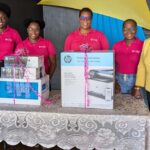The Paralympic Movement in Barbados reached a turning point on Wednesday morning, as stakeholders gathered at the Garfield Sobers Sports Complex to unveil the findings of a groundbreaking pilot project aimed at strengthening the National Paralympic Committees (NPCs) in the Caribbean.
The initiative, Institutional Strengthening of National Paralympic Committees’ Caribbean Islands Project, led by the Americas Paralympic Committee (AmPC) and funded by the Development Bank of Latin America and the Caribbean (CAF), focused on Barbados, Jamaica, and Trinidad and Tobago as part of a broader effort to drive social inclusion through sport.
At the heart of the project is a clear goal of building institutional capacity so that parasport can thrive, not only at the elite level but from the grassroots up. For the newly appointed President of the Paralympic Association of Barbados (PAB) Ryan Brathwaite, the moment was both symbolic and deeply personal.
“Sport is about access, dignity, and belonging,” Brathwaite told attendees. “Yesterday’s inaugural Parasport Festival wasn’t just a showcase — it was a statement. A space for students, para-athletes, and the public to see, feel, and understand the power of inclusive sport.”
The president also added that the network was not just based on a project.
“This collaboration represents more than a project,” Brathwaite contended. “It’s a shared belief that sport can transform lives — and now, we have a roadmap to make that belief real.”
According to AmPC Executive Director Michelle Formonte, over the last 16 months, the project examined national sports policy, audited infrastructure accessibility, and trained a new generation of coaches, classifiers, and officials, 71 per cent of whom are women. These efforts have laid a strong foundation for lasting impact.
“This isn’t the end,” Formonte said. “Today we celebrate results, but we also plant a seed.”
CAF’s Director of Inclusion Juan Pablo Salazar emphasised the need for regulatory reform and long-term structural support. While Barbados ranked highest in accessibility among the three pilot nations, he noted that real inclusion cannot rest on goodwill alone.
“Right now, we have great people like Ryan, Martin, and the rest of the team,” Salazar said. “But this can’t depend solely on individuals. We need laws and institutions that ensure access to sport is a guaranteed right, not a fortunate exception.”
Salazar went further, highlighting the broader impact of systemic change. “When we create inclusive systems in sport, we’re not just building athletes — we’re changing how society sees and includes persons with disabilities across the board,” he said. “That’s why this project matters. It’s a template for how inclusion can be embedded into public life.”
The project also sparked a heartfelt response from the local government. Minister in the Ministry of Finance Ryan Straughan shared a personal story of his autistic son learning to swim through the late Michael Young’s Adaptive Aquatics programme. Straughan announced a $100 000 commitment to continue that legacy through training at Camp Aquarius.
Minister of Youth, Sport, and Community Empowerment Charles Griffith echoed that energy.
“We had only one athlete at the last Paralympics,” he said. “Never again.” Plans are underway for a coaching exchange with Nippon Sports and Science University in Japan, and facilities are already being upgraded for accessibility.
The takeaway was clear that Barbados is ready to lead by example in the region. With strong partnerships, committed leadership, and growing public awareness, parasport in the Caribbean is gaining the structure and visibility it needs to thrive.
(AS)
The post Barbados charts new path for inclusive sport with Paralympic pilot project appeared first on Barbados Today.


